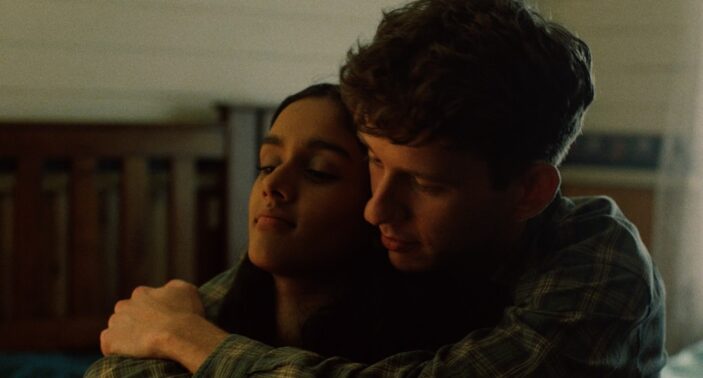
Given that Jim Weir and Jack Clark‘s frighteningly uncomfortable Birdeater is an Australian chiller set in the outback (at least for the majority of its running time), audiences are justified in thinking it could fall in line with other brutality-in-the-bush titles like Picnic at Hanging Rock or even Wolf Creek. The more accurate comparison though would be Ted Kotcheff’s 1971 Ozploitation offering Wake In Fright, with several sequences serving as visual nods throughout, as well as the general thematic of its central figure crumbling into moral degradation; the Wake In Fright poster hanging in the background of a character’s apartment here truly driving the inspiration home.
From the opening it’s evident that something isn’t sitting quite right with the union of Louie (Mackenzie Fearnley) and Irene (Shabana Azeez). He stares directly at the camera from the opening second, with the reveal that he’s eyeing her down at a beach party of sorts, leading to what Birdeater initially frames as something of a loving relationship. We are witness to a montage of laughter and sex, and the indication that he has proposed, but slowly but surely a sense of discomfort lingers over their actions. She appears too scared to be left alone. He promises he won’t leave her side, but then does so after drugging her into induced sleep. There’s almost an uncertainty in their actions. It naturally makes us as an audience ask questions, and Weir and Clark delight in the torture of making us wait.
It all comes to a head at his bucks party weekend, an event that Louie intends to be a lowkey affair. So lowkey that he’s even invited Irene along – a move that makes little sense initially, but eventually proves a further feather in his gaslighting cap – which, understandably, confuses his best mates, Dylan (Ben Hunter, an absolute scene-stealer), Murph (Alfie Gledhill), and Charlie (Jack Bannister); Charlie has then extended the invite to his fiancé, Grace (Clementine Anderson), as a way to make Irene feel less uncomfortable. The irony of Irene feeling uncomfortable becomes glaringly apparent as the night steams ahead.
Dylan, the self-appointed master of chaos, has every intention of fuelling the party (literally) with the alcoholic and substance abuse that seem to go hand-in-hand with such an event, and he can’t entirely understand why Louie especially has such an aversion to the idea. In fact, Dylan has trouble understanding a lot of what’s taking (and taken) place. When it’s revealed to him that Irene is coming along, he’s particularly disheartened. Then there’s the fact that Louie is sporting a nasty head scar after surviving an apparent accident. The details Weir and Clark tease out start to paint a bigger picture of toxicity across all the relationships at hand; even Charlie and Grace, who appear like a strong enough foundation, and the reveal of their respective virginities are brought into question.
The first day of them all coming together is mostly an affair of unbridled gaiety. Drinks are free poured, there’s a blow-up sex doll on hand for good measure, and, slight paranoia aside, everyone seems to put their issues aside for the sake of celebrating Louie and Irene. But if they’re a couple worth celebrating becomes a valid point of argument as the evening spirals towards a campfire game named, fittingly enough, “Paranoia”. Dylan, who seems to be gunning for Louie at every chance he gets – his dinner speech starts off lovingly enough, before it descends into anecdotes of masked cruelty – delights in the rules of the game, where his coin toss determines whether or not a whispered question between two people is publicly asked or not. Regardless, the two people audibly answer with a name. Louie is uttered consistently. The questions are not.
By this point Birdeater has masterfully put its entire audience on edge. If “Paranoia” wasn’t enough, the reveal of Louie and Irene’s relationship dynamic at dinner is sure to tip us over the edge. What that dynamic is is best left for the audience to uncover in real time, as the scales of power and trust continually tip between Louie and Irene, and the conversations had around such by Dylan, Murph, Charlie, Grace, and the uninvited Sam (Harley Wilson), his presence also bringing about a multitude of questions, organically touch on the differing views we are likely to have as bystanders.
A film that embraces what it is to be truly horrific, Birdeater leans into the brutality of psychological and emotional abuse; we throw around the word “gaslighting” a lot, but Weir and Clark fundamentally showcase what that looks like. Perhaps the scariest aspect of the film – save for a truly frightening drug-and-drink fuelled visit to an open forest land where the boys are “entertained” by a mobile-service stripper – is how much is left unanswered. There are multiple relationships and friendships put to the test due to a hostility towards the truth in some capacity, and even when such a lie is exposed, Weir and Clark’s script refuses to allow resolution.
Visceral and feral, Birdeater blends its topical commentary on separation anxiety and fragile masculinity with an almost hallucinatory mentality. Its intrusive editing and claustrophobic camera shots further highlight Weir and Clark’s stronghold on genre execution, resulting in a truly horrific vision that revels in its uncompromising temperament.
![]()
![]()
![]()
![]()
![]()
FIVE STARS (OUT OF FIVE)
Birdeater is screening as part of this year’s Brisbane International Film Festival, running between October 26th and November 5th, 2023.
